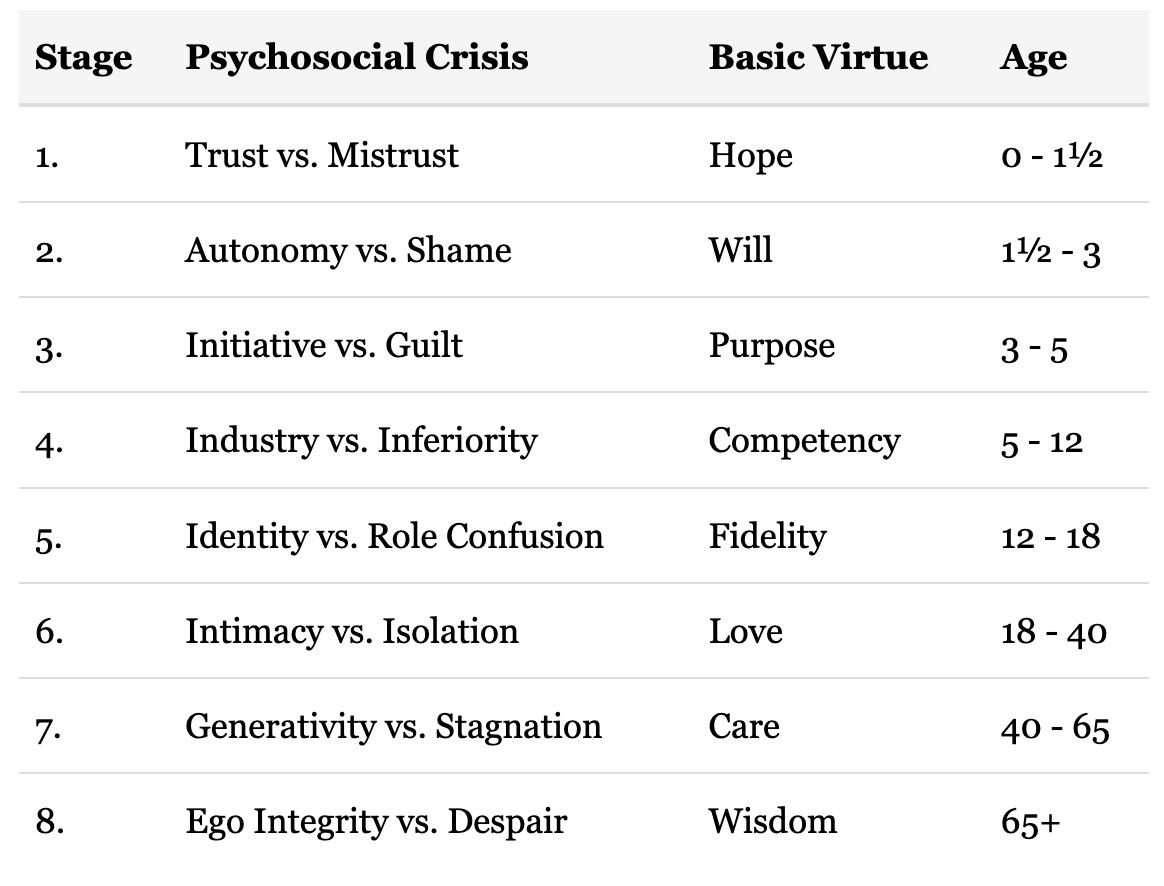Gradually Realizing a Sound Personality——A Brief Introduction to Erickson's Theory of "Stages of Social Psychological Development"
Erik Homburger Erikson (1902-1994) was a German-American developmental psychologist and psychoanalyst, known for his theory of psychosocial development. He is also known for coining the term identity crisis. In the 1950s, Erikson created the theory of "stages of psychosocial development" as an improvement on Freud's stages of psychosexual development.
Erikson believed that the development of a person's sense of self lasts a lifetime. He divided the formation and development of self-awareness into eight stages:
- Infancy (0-2 years old)
- Childhood (2-4 years old)
- Early childhood (4-5 years old)
- Middle childhood (5-12 years old)
- Adolescence (13-19 years old)
- Early adulthood (20-39 years old)
- Middle adulthood (40-64 years old)
- Late adulthood (age 65 - death)

This table contains the most important parts of the theory: the main psychological conflicts at each stage, and the qualities acquired after successfully passing through the stage.
(The age in the picture is slightly different from the age taken from Wikipedia above. I have not checked it separately, but they are also used as a reference and should not be a stuck limit.)
This set of theories not only provides a theoretical basis and educational content for the education of children of all ages, but also tells everyone why you are what you are now, which of your psychological qualities are positive, which are negative, and which age group is most formed Yes, to give you a basis for reflection.
The following is my summary of the stages of "social psychological development" based on Chinese and English materials, not my personal views.
- Infancy (0-2 years): "Can I trust the world?" The presence of a caregiver when a baby is hungry or needs reassurance is key to building a sense of trust. Trust forms the quality of " hope " in the personality. Children with a sense of trust dare to hope and are full of ideals, otherwise they dare not hope and are always worried that their needs will not be met.
- Toddlers (2-4 years old): "Can I be myself?" Toddlers usually toilet train and dress themselves at this stage. At this point he begins to have a " will " to decide what to do or not to do. If the caregiver/environment does not allow him to exercise his will, the toddler may begin to question his abilities, leading to low self-esteem and shame.
- Early childhood (ages 4-5): "Is it okay to be, move, and act for myself?" Children in early childhood begin to explore, use tools, and create art. If these behaviors are encouraged, he develops "initiative" and acquires the quality of " purpose ." This laid the foundation for him to become a responsible and creative person in the future. On the contrary, children whose active creative behavior is repressed at this stage will feel guilty and lose confidence.
- Middle childhood (5-12 years old) "Can I do something with people and things all over the world?" School-age children face the main conflict between hard work and low self-esteem. If they can successfully complete the study courses, they will gain a sense of diligence, which makes them full of confidence in their independent life and undertaking work tasks in the future. On the contrary, it will produce inferiority complex. When the sense of diligence is greater than the sense of inferiority, they will acquire the quality of " competence ".
- Adolescence (13-19 years) "Who am I? What can I be?" The main task of adolescence is to find yourself and build a new sense of identity or image of yourself in the eyes of others. The crisis at this stage is role confusion. Erikson says, "This sense of oneness is also a growing sense of self-confidence, an inner continuity and sense of identity (one's psychological self) that has been developed through past experiences. It will obviously add color to one's career." Along with self-identity comes the quality of " loyalty ". Erikson defines loyalty as: "The ability to hold on to one's own affirmed identity despite the inevitable contradictions of a value system."
- Early adulthood (20-39 years old) "Can I love?" Only young people with a strong self-identity dare to take the risk of intimacy with others. For to be in love with another is to fuse one's own identity with that of another. The main conflict during this period is intimacy versus solitude. Willingness to self-sacrifice, cultivating the ability to care for each other and share weal and woe will give you the quality of " love ".
- Mid-adulthood (40-64 years old) "How to complete the life I think?" Usually in mid-adulthood, people not only have children, but also undertake social work. This is the period when one's concern and creativity for the next generation is at its strongest. People pursue successful personal careers, caring and cultivating the next generation, and acquiring the quality of " caring ". The opposite state of creation is stagnation, where a person who is not fully developed feels as if he "failed to leave a meaningful mark on the world."
- Late adulthood (65 years old - death) "Are you satisfied with the process of being myself?" Due to the aging process, the elderly's physical strength, motivation and health are deteriorating, and they must make corresponding adjustments and adaptations, so they are called self Adjust the psychological conflict with the sense of hopelessness. Self-regulation is a feeling of acceptance of yourself, of acknowledging reality. If a person's self-adjustment is greater than despair, he will acquire the quality of " wisdom ", which Erikson defines as "a detached attitude towards life and death".

This theory was put forward in the 50's when 65 was considered old age and now in some countries/for some occupations it's not retirement age! Observing the emotions posted by friends around me and everyone on social networks, I feel that the development of most people is much later than the age group given above. Many friends (including myself) in their 20s and 30s are still questioning "Who am I? What can I be?" Ha:)
According to Erikson, each stage builds upon the successful completion of the tasks of the earlier stages. Failure to successfully complete the challenges of this stage will cause problems again in the future .
I think this is a very interesting framework. Applied to myself, I probably found that it is difficult to pursue a truly mature intimate relationship before achieving self-identity.
At the same time, the development of personality does not necessarily follow a single path. For example, I, who have not reached the last two stages of my age, are also practicing caring, creativity and self-acceptance.
Out of curiosity, everyone who reads this, what stage do you think you are at? Would you find this theory helpful?
I'm going to start studying psychology next month, so I'm looking forward to it! At that time, I will share more knowledge of psychology here (ノ◕ヮ◕)ノ*:・゚✧
refer to:
https://zh.wikipedia.org/zh-hant/Ericksonian stages of psychosocial development
https://zh.wikipedia.org/wiki/Eric Eriksson
Like my work? Don't forget to support and clap, let me know that you are with me on the road of creation. Keep this enthusiasm together!
